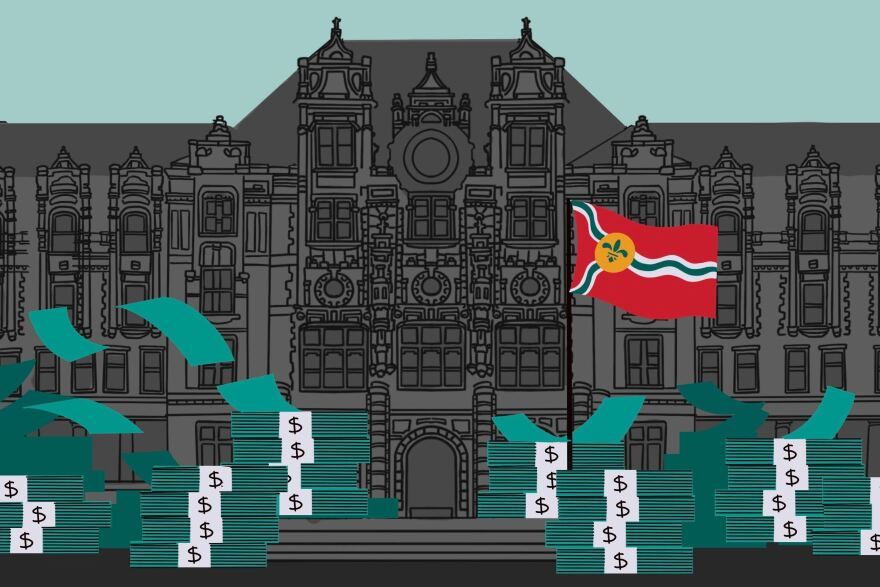After a 12-hour discussion, the St. Louis Board of Aldermen gave initial approval to a $168 million pandemic aid plan that includes money for one-time cash payments to low-income residents and vaccine incentives.
It lays out how the city will spend the first wave of federal coronavirus relief money granted through the American Rescue Plan Act. St. Louis will get nearly a half-billion dollars over the next two years, including $249 million already received. Aldermen gave the plan preliminary approval after the lengthy debate Tuesday and are expected to take a final vote on Friday.
During a press conference Wednesday, Mayor Tishaura Jones praised the proposal for including her top priorities, which she has laid out in a separate $81 million plan.
The bill notably includes a Jones-backed amendment for $5 million in one-time cash payments of $500 that would go to an anticipated 10,000 people who earn less than 80% of the city’s median income.
“Almost 50% of Americans don’t have $400 for emergencies. This direct relief helps,” she said.
The issue has been a major sticking point in getting the plan approved. Board President Lewis Reed did not include the measure in the original bill, which he sponsored. But aldermen compromised on an amendment that allows the city’s department of human services and the U.S. Treasury to work together to distribute the funds. Reed voted against the amendment.
Aldermen also passed an amendment containing a severability clause, which supporters said would allow the rest of the bill to stay intact in the event that a provision of the bill is later found to be not in compliance with federal spending guidelines.
Some members who voted against including the severability clause, including Alderwoman Marlene Davis, who represents Ward 19, said during the marathon meeting that their concerns stem from a distrust with the mayoral administration’s handling of legislative issues.
“I’m hoping the mayor’s office will settle down and we can work together,” she said.
The Jones administration has clashed with Reed and aldermen over the past few weeks over how to spend the pandemic relief money.
The administration has held several press conferences calling on Reed to reinstate the $5 million for cash assistance. Jones took a different approach on Tuesday, providing a legal opinion from the city counselor that states part of Reed’s bill to earmark roughly $33 million for economic development along four major commercial corridors in north St. Louis and $20 million to fix dilapidated housing may not be in compliance with federal spending rules.
“The most recent U.S. Treasury guidance indicates general economic development is not an allowable use of the ARPA funds as a general rule. Accordingly, in absence of further clarity from the U.S. Treasury, recommendations for use of ARPA funds should comply with this parameter,” wrote interim city counselor Matt Moak.
In hopes of avoiding compliance issues, the board approved an amendment to change the wording of the corridor funds to “economic empowerment funds.” But Jones said Wednesday additional fixes are needed.
The bill also has a new amendment outlining $1.25 million for vaccine incentives in the form prepaid debit cards up to $100.
Alderwoman Shameem Clark Hubbard, who represents the 26th Ward, sponsored the amendment, which she said will help increase the city’s low vaccination rates. Less than 35% of people in St. Louis are fully vaccinated, about 10 percentage points lower than in St. Louis and St. Charles counties.
“Now, when you come you can get this incentive to bring some more people back in. Because you know we had big-big-big ones and then it slowed all the way down. And now we’re dealing with this delta variant,” Clark Hubbard said.
The bill now heads to the city’s top fiscal body, the Board of Estimate and Apportionment. Aldermen are hoping to pass the final bill on Friday ahead of their summer recess.
Highlights from the pandemic aid plan include:
- $5 million for one-time cash payments of up to $500 for an anticipated 10,000 low-income residents.
- $1.25 million for vaccine incentives in the form of up to $100 prepaid debit cards.
- $33 million to spur development along four major north St. Louis streets, including Dr. Martin Luther King Drive, West Florissant Avenue, North Grand Boulevard and Natural Bridge Avenue.
- $20 million for a citywide housing development fund.
- $5 million to modernize city Election Board equipment, which will allow people to vote from any polling place.
- $5 million for the Cops and Clinicians program, which dispatches mental health professionals to some 911 calls.
- $2 million for the St. Louis Area Agency on Aging for home repair and $1.5 million for direct support care workers.
- $5 million for police overtime.
- $5.3 million for jobs training programs and services.
- $5.6 million for affordable housing services.
- $12.4 million for rental and utility assistance.
- $2 million for so-called intentional homeless encampments.
Follow Corinne on Twitter: @corinnesusan





